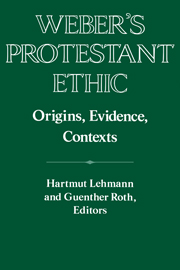Book contents
- Frontmatter
- Introduction
- Part I Background and Context
- 1 The German Theological Sources and Protestant Church Politics
- 2 The Thesis before Weber: An Archaeology
- 3 Max Weber, Protestantism, and the Debate around 1900
- 4 Weber the Would-Be Englishman: Anglophilia and Family History
- 5 Weber's Historical Concept of National Identity
- 6 Nietzsche's Monastery for Freer Spirits and Weber's Sect
- 7 Weber's Ascetic Practices of the Self
- 8 The Protestant Ethic versus the “New Ethic”
- 9 The Rise of Capitalism: Weber versus Sombart
- Part II Reception and Response
- Index
2 - The Thesis before Weber: An Archaeology
Published online by Cambridge University Press: 05 January 2013
- Frontmatter
- Introduction
- Part I Background and Context
- 1 The German Theological Sources and Protestant Church Politics
- 2 The Thesis before Weber: An Archaeology
- 3 Max Weber, Protestantism, and the Debate around 1900
- 4 Weber the Would-Be Englishman: Anglophilia and Family History
- 5 Weber's Historical Concept of National Identity
- 6 Nietzsche's Monastery for Freer Spirits and Weber's Sect
- 7 Weber's Ascetic Practices of the Self
- 8 The Protestant Ethic versus the “New Ethic”
- 9 The Rise of Capitalism: Weber versus Sombart
- Part II Reception and Response
- Index
Summary
The thesis of a relation between Protestant ethics and the spirit of capitalism has never gone out of fashion since Max Weber wrote his fascinating articles in the years 1904-1905. The discussion, since the first reviews and Weber's rejoinders, offers a highly contradictory picture, as does the entire debate, which now shows signs of reviving. The whole discourse seems to go around in a circle, despite all progress in detail.
This persistent fascination results, above all, from the fact that the interdisciplinary discussion never really went far enough. From the beginning, the party of convinced Weberians, mainly recruited from among sociologists, faced irreconcilable opposition from a party of professed Weber critics who came from different historical camps. The numbing discussion shows some of the traits of that fruitless casuistry popularly called “scholasticism.” The struggle sometimes amounts almost to a war between “believers” and “infidels.” Some sociologists, who see their subject as a social science without any historical background, evidently know little about the cultural, social, and economic history of early modern times, unlike Weber and his contemporaries. For these ahistorical sociologists, capitalism is the inseparable reverse of the Calvinist coin. Some of these opponents do not argue from the historically variegated Calvinism, but only from Weber's ideal type. Starting from this ideal type, they come to regard Calvinism as the breeding ground not only of economic but also of political and scientific progress - a conclusion for which Weber is only indirectly responsible.
- Type
- Chapter
- Information
- Weber's Protestant EthicOrigins, Evidence, Contexts, pp. 51 - 72Publisher: Cambridge University PressPrint publication year: 1993
- 3
- Cited by



